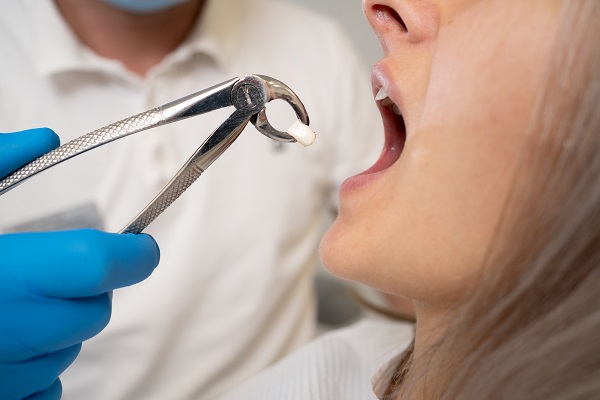A Step-by-step Guide to a Tooth Extraction Procedure
may seem like a scary or daunting procedure, but it’s safe with few potentials for complications. We’re going to go through all the major steps to help put your mind at ease and make you more comfortable about any upcoming procedures.
Step one: applying the anesthetic
First, the dentist will administer an anesthetic. They may use a local anesthetic to numb only the tooth and surrounding tissue, or they may use a general anesthetic, which will put the patient to sleep. Awake patients may still feel some pressure as the dentist loosens the tooth, which is completely normal.
Step two: extracting the tooth
To ready the tooth for extraction, the dentist will use specialized tools called dental elevators. They will elevate the tooth, coaxing it from the jawbone to loosen it. Many different kinds of dental elevators are specialized for specific kinds of teeth. Once the tooth has been sufficiently loosened, the dentist will remove it with forceps. This is called a simple extraction.
If the tooth is impacted, meaning that it has not emerged from the gums, then a different option called a surgical extraction would be used. In this case, the dentist will need to cut into the gums to reach the tooth. The dentist may need to cut the tooth into pieces to remove it more easily. Patients should not feel any pain.
Step three: post-surgical Care
After the tooth extraction, patients will bite down on the gauze for about 30 minutes. This will generate pressure which will help to form a blood clot. If necessary, a dentist will also stitch any incisions. If the stitches are self-dissolving, then patients will not need to return to get them removed later. If general anesthesia was applied, the patient must wait in the dentist’s care until it is safe to leave, and they may not drive. Before leaving, the dentist will give any necessary instructions to the patient.
Step Four: Post-surgical Recovery
There may be some discomfort in the days following the surgery. It is important to rest and allow your body time to heal. If needed, over-the-counter medications such as Ibuprofen or other NSAIDs should be taken as needed to help manage the pain.
Several important guidelines recovering patients should follow. They should only eat soft foods and liquids for the first 24 hours, they should not brush their teeth for 24 hours, and they should not use a straw or chew on the same side of their mouth as the extraction site for several days. If these guidelines are not followed, it is possible to dislodge the blood clot, exposing the bone and tissue below. This leads to a painful condition called dry socket. Patients experiencing dry sockets should let their dentists know as soon as possible to get it resolved.
Patients should be starting to feel better after a few days, but it might take up to a couple of weeks for the wound to close entirely, and it might also take up to three months for the tissue around the tooth extraction site to completely heal.
Request an appointment here: https://www.kingsdentalgroup.com or call Kings Dental Group at (559) 471-1145 for an appointment in our Lemoore office.
Check out what others are saying about our dental services on Yelp: .
Related Posts
A toothache is often the first sign that you need to visit the emergency dentist. If the toothache persists for more than a few days, you could be dealing with an infected tooth or worse. Without treatment, the situation may worsen and cause eventual tooth loss. The dentist will examine the tooth to learn the…
Same day dentistry options are helping people fit dental care into their busy and fast-paced lives. If you have been putting off dental work because you have a busy schedule, then a same-day dentistry may help. You may find that one or more of the procedures you have been putting off can be completed in…
Practicing preventive dentistry is an effective way to establish good oral health. Strict personal oral hygiene practices result in fewer dental problems. Strengthening these practices with regular dental appointments makes preventive dental care even more efficient. Preventive dentistry becomes even more effective by avoiding some bad habits.This habit increases the risk of chipping teeth. It…
If you have a cracked, discolored, or chipped tooth, dental bonding can be a good option. This is a cosmetic dental procedure and can encourage you to smile more. In the procedure, your dentist will apply resin to your teeth that is the same color as your teeth. That can repair any damage. It can…
